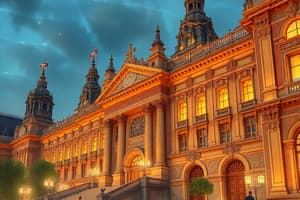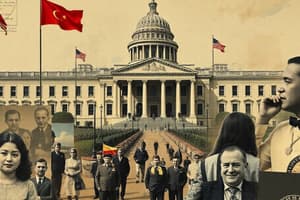Podcast
Questions and Answers
What is the primary characteristic of a monarchic system of government?
What is the primary characteristic of a monarchic system of government?
- A single person holds supreme power, often inherited through family lines. (correct)
- Power is held by a religious institution or leader.
- Power is concentrated in the hands of a small group of individuals.
- Power is held by the people or their elected representatives.
Which branch of government is responsible for enforcing laws?
Which branch of government is responsible for enforcing laws?
- Administrative
- Legislative
- Judicial
- Executive (correct)
What is the term for the idea that a government has supreme authority over its territory and citizens?
What is the term for the idea that a government has supreme authority over its territory and citizens?
- Sovereignty (correct)
- Unitary system
- Federalism
- Separation of powers
What is the primary characteristic of a federal system of government?
What is the primary characteristic of a federal system of government?
What is the term for the process of creating and implementing policies that affect the general public?
What is the term for the process of creating and implementing policies that affect the general public?
Which system of government is characterized by power being held by the people or their elected representatives?
Which system of government is characterized by power being held by the people or their elected representatives?
What is the term for the idea that power should be divided among different branches of government to prevent abuse of power?
What is the term for the idea that power should be divided among different branches of government to prevent abuse of power?
What is the primary characteristic of a confederal system of government?
What is the primary characteristic of a confederal system of government?
Flashcards are hidden until you start studying
Study Notes
Types of Government
- Monarchy: A system where a single person (monarch) holds supreme power, often inherited through family lines.
- Republic: A system where power is held by the people or their elected representatives, rather than a monarch.
- Democracy: A system where power is held directly by the people, either directly or through elected representatives.
- Authoritarian: A system where power is concentrated in the hands of a single individual or small group, often with limited individual freedoms.
- Theocracy: A system where power is held by a religious institution or leader.
Branches of Government
- Legislative: The branch responsible for making laws, often a parliament or congress.
- Executive: The branch responsible for enforcing laws, often headed by a president or prime minister.
- Judicial: The branch responsible for interpreting laws, often composed of courts and judges.
Forms of Government
- Unitary: A system where power is held by a single central authority, with little or no regional autonomy.
- Federal: A system where power is divided between a central authority and smaller regional units (states or provinces).
- Confederal: A system where power is held by a loose alliance of regional units, with little central authority.
Government Functions
- Lawmaking: The process of creating and passing laws.
- Law enforcement: The process of enforcing laws and maintaining order.
- Public policy: The process of creating and implementing policies that affect the general public.
- Public administration: The process of managing and implementing government programs and services.
Key Government Concepts
- Sovereignty: The idea that a government has supreme authority over its territory and citizens.
- Separation of powers: The idea that power should be divided among different branches of government to prevent abuse of power.
- Checks and balances: The system of limits and controls placed on each branch of government to prevent abuse of power.
- Representation: The idea that citizens are represented by elected officials in government.
Types of Government
- A monarch holds supreme power in a monarchy, often inherited through family lines.
- In a republic, power is held by the people or their elected representatives.
- Democracy allows people to hold power directly or through elected representatives.
- Authoritarian systems concentrate power in a single individual or small group, limiting individual freedoms.
- Theocratic systems give power to a religious institution or leader.
Branches of Government
- The legislative branch makes laws, often through a parliament or congress.
- The executive branch enforces laws, headed by a president or prime minister.
- The judicial branch interprets laws, composed of courts and judges.
Forms of Government
- Unitary systems give power to a single central authority, with little regional autonomy.
- Federal systems divide power between a central authority and smaller regional units (states or provinces).
- Confederal systems give power to a loose alliance of regional units, with little central authority.
Government Functions
- Lawmaking involves creating and passing laws.
- Law enforcement involves enforcing laws and maintaining order.
- Public policy involves creating and implementing policies that affect the general public.
- Public administration involves managing and implementing government programs and services.
Key Government Concepts
- Sovereignty refers to a government's supreme authority over its territory and citizens.
- Separation of powers divides power among different branches of government to prevent abuse.
- Checks and balances limit each branch's power to prevent abuse.
- Representation involves citizens being represented by elected officials in government.
Studying That Suits You
Use AI to generate personalized quizzes and flashcards to suit your learning preferences.




